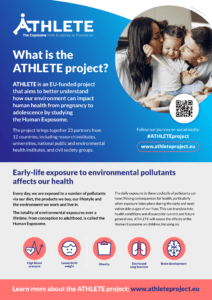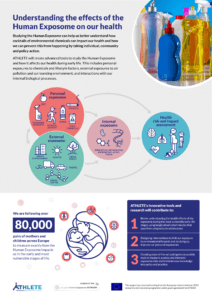Advancing Tools for Human Early Lifecourse Exposome Research and Translation (ATHLETE) is the EU-funded exposome research project coordinated by ISGlobal.
The aim of the project is to study the effects of many environmental hazards in human health from preconception until adolescence. The final goal is to develop a toolbox that can be used to evaluate the effects of a large group of environmental exposures in individuals as well as in communities in order to design policies and interventions to prevent them and to reduce health impacts.
HEAL is a project partner and leads the work package on dissemination and exploitation towards policy interventions.
The consortium consists of 22 partners from eleven European countries and the United States.
Project objectives:
- To develop a dissemination and exploitation strategy to guarantee the engagement of relevant stakeholders all throughout the project and timely dissemination of relevant findings and key outputs;
- To translate the project findings into accessible materials to promote their visibility and uptake (for example, via public, media), including making sure all of these are made available via the project online toolbox;
- To use project results to derive policy recommendations and engage relevant exposome targets, in order to promote health conducive interventions and policy changes to improve people’s exposomes on the basis of the project findings.
- To develop and maintain the project website and ATHLETE online toolbox.
Resources from the ATHLETE project:
- Visit the ATHLETE project glossary, explaining the most commonly used terms with relation to the Human Exposome.
- Download the ATHLETE flyer, available in 10 languages, introducing the research project and how we are bringing together scientists and specialists from 23 partner organisations to study the Human Exposome.
- Watch this video, available in 11 languages, illustrating how the ATHLETE project can help us better understand how environmental pollutants affect our health over a lifetime, and how we can prevent this from happening.
- Visit ATHLETE’s overview paper in the Journal of Environmental Epidemiology, which sees researchers behind the project describe exactly why studying the Exposome from the earliest stages of life is a key opportunity towards disease prevention.
- Watch the recording of the first-ever ATHLETE webinar, organised in collaboration with HEAL, where Dr. Kelly Ferguson (NIEHS) presented her work on prenatal exposure to nonpersistent chemical mixtures and fetal growth (December 2022)




